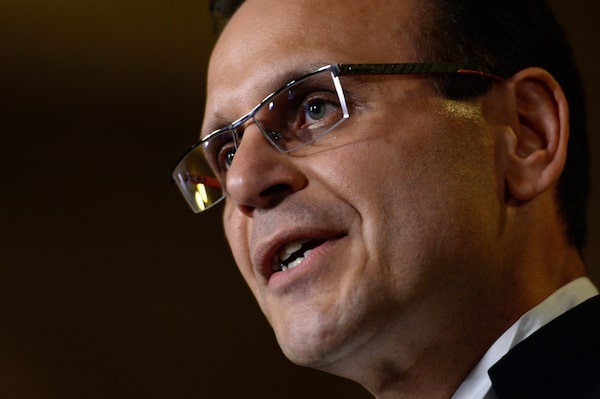
Leo Housakos speaks at a news conference in the Senate foyer on Parliament Hill on June 9, 2015.Sean Kilpatrick/The Canadian Press
A bill that would set up a public registry to track those seeking to influence government on behalf of foreign countries is gaining support among Canadians concerned about the efforts by Russia, Iran and China to lobby policy makers.
Conservative Senator Leo Housakos has tabled a bill in the Senate, S-237, that would require those acting on behalf of a foreign government or entities related to that government to register. This obligation would be triggered if they seek to influence public policy, legislation, regulations and government programs or if they want to set up meetings with public officeholders.
Mr. Housakos said he believes that under such a law, former Quebec premier Jean Charest would have been required to register for his work with the Chinese tech giant Huawei.
It’s the second effort in Canada to create a registry that is similar to ones set up in the United States and Australia. Britain last year also launched consultations on enacting a registry. A House of Commons bill by former Conservative MP Kenny Chiu died on the order paper when Parliament was dissolved for the 2021 election campaign.
Canada’s spy agency has been warning individual MPs and senators from all major parties about influence operations being carried out by China, Russia and other adversarial states.
The Ukrainian Canadian Congress, a lobby group representing citizens of Ukrainian heritage, says it backs Mr. Housakos’s bill as does the Central and Eastern European Council. The CEEC is an umbrella group that represents groups advocating for Canadians who trace their heritage to Albania, the Czech Republic, Slovakia, Estonia, Hungary, Latvia, Lithuania, Poland and Ukraine.
Alexandra Chyczij, national president of the Ukrainian Canadian Congress, said the legislation is especially necessary given Russia’s military assault on Ukraine.
“The war crimes and crimes against humanity Russia is committing in Ukraine have shocked the world. Canada must do much more than it is currently doing to counter the pernicious influence of adversarial states like Russia on our democratic processes,” Ms. Chyczij said, calling the legislation “a good step towards transparency and accountability.”
Marcus Kolga, the CEEC chair and a senior fellow at the Macdonald-Laurier Institute think tank, said he’s particularly concerned about Russian influence on the Canadian government. “We’ve seen trade associations, former diplomats and academics who are clearly trying to advance Russia’s influence in Canada,” Mr. Kolga said.
“The Central and Eastern European community in Canada – the 4.5 million people whose origins are in that area – absolutely support this bill,” he said.
Mr. Kolga said he believes “Putin’s proxies in this country are actively lobbying in defence of Putin’s barbaric invasion of Ukraine.”
Avideh Motmaen-Far, president of the Council of Iranian Canadians, said her group would like to see this foreign-influence registry become law. She said the “operatives and sympathizers” working on behalf of the Iranian government have been “really actively lobbing for the regime” in Canada.
Senator Yuen Pau Woo has said he’s concerned that the registration requirements in the previous Commons foreign-registry bill could cast a very wide net in the case of China.
He argued in a recent article in Policy Options magazine that since the People’s Republic of China is an authoritarian state, “one could reasonably argue that all legally constituted entities in China – including corporations, educational institutions, alumni organizations, cultural groups and municipalities – fall under the definition of foreign principal.”
Speaking on S-237 in the Senate last week, Mr. Woo said that Mr. Housakos seems to be suggesting that under his bill, any Canadians with ties to a Chinese entity would be required to register if they want to speak to a senior public official on behalf of that entity.
He said he fears that the registry, for instance, could affect “a cultural organization in China that wants to promote cultural ties with Canada and, through its agent here in Toronto or Montreal, wants to speak with me, for example, about having a concert in Calgary or some other city.”
The bill would require groups tied to a foreign government to register if they want to arrange a meeting with a senior public officeholder.
Mr. Housakos said if a dance troupe from China is being influenced to get involved in Canada’s public policy, then it would have to register. But it wouldn’t have to register if, for example, it’s merely talking to the Department of Canadian Heritage to arrange to participate in a Canada Day celebration.
The senator said the bill would affect those working on behalf of all countries and not just Russia, Iran or China, he noted.
“Any country that tries to influence our public-policy making will have to register.”
Akshay Singh, a research fellow at the Council on International Policy, said Canada currently lacks any “meaningful legislative framework” to address issues related to foreign interference. In the absence of that, “Canadian authorities often cannot identify or penalize those who may be clandestinely or deceptively acting on behalf of hostile state actors.”
Cherie Wong, the executive director of Alliance Canada Hong Kong, an umbrella group for Hong Kong pro-democracy activists in Canada, called the bill “a much-needed first step” but said a more far-reaching approach is needed to combat “far more sophisticated” forms of foreign interference.
For subscribers only: Get exclusive political news and analysis by signing up for the Politics Briefing.
 Steven Chase
Steven Chase